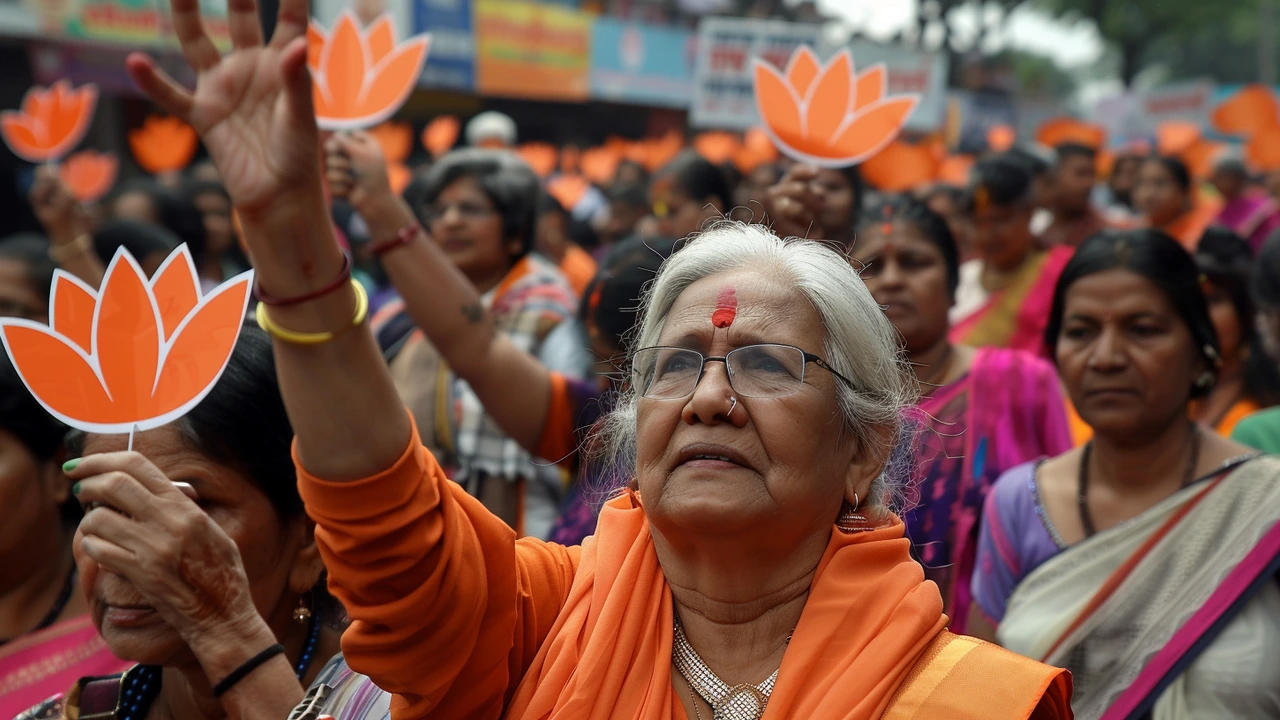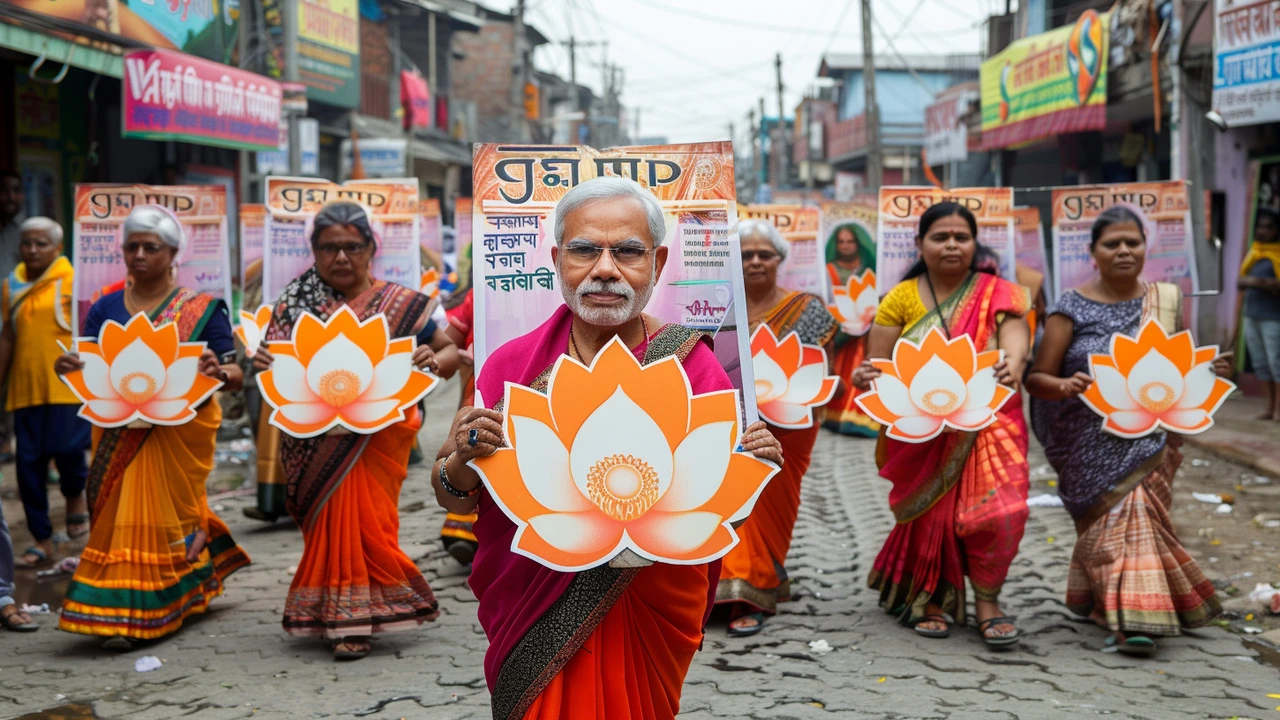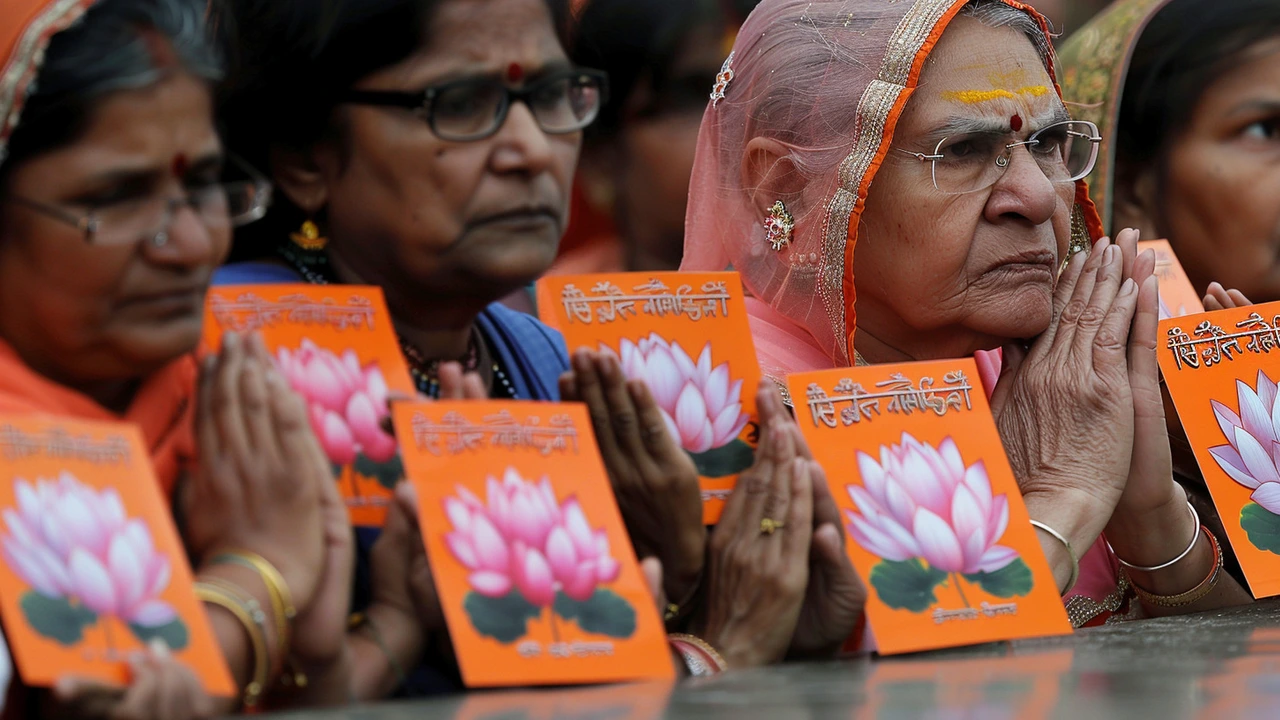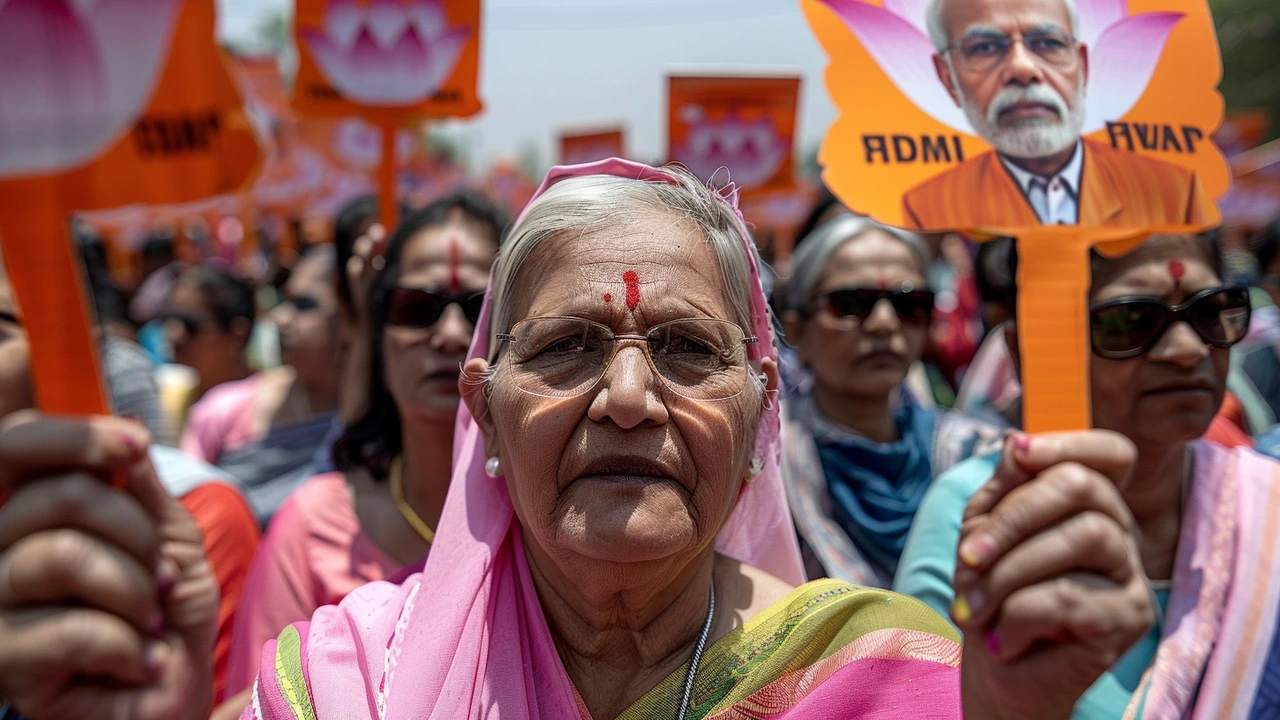The counting of votes for the 2024 Lok Sabha elections commenced on June 4, creating a highly charged atmosphere across India. In the early trends, the BJP-led National Democratic Alliance (NDA) has taken a lead, signaling a potential third consecutive term for Prime Minister Narendra Modi. This year’s election has been particularly significant as Modi and his party, the BJP, seek to continue their governance, while the Congress-led INDIA bloc aims to disrupt their streak and take the reins of power.
As anticipated, the early trends have been in favor of the NDA, with many exit polls predicting a return to power for Narendra Modi. Should this happen, Modi will join the ranks of India’s first Prime Minister, Jawaharlal Nehru, by securing a third successive term. The impact of this potential victory is monumental, not only for the NDA but also for the political fabric of India.
This election saw participation from over 8,000 candidates, reflecting the diverse political representation of the country. Amidst the general elections, the counting for the State Legislative Assemblies of Andhra Pradesh and Odisha, alongside several bypolls in 25 Assembly constituencies, is also underway. The comprehensive nature of this election process has underscored the need for stringent security measures. Authorities have deployed significant resources to ensure the safety and integrity of the electoral process, safeguarding both the candidates and the voters.
A number of prominent leaders are awaiting the outcome with bated breath. Prime Minister Narendra Modi, Home Minister Amit Shah, and Defence Minister Rajnath Singh are among the critical figures whose political future hinges on these results. On the opposition front, leaders like Rahul Gandhi, Supriya Sule, and Akhilesh Yadav are keenly watching the trends, with hopes of turning the tide in their favor.
Interestingly, two key exit polls have predicted that the BJP is likely to improve upon its performance from the 2019 elections, where the party secured 303 seats. Should this prediction hold, it would solidify Modi’s position and the BJP’s dominance in Indian politics, while presenting a formidable challenge to the opposition parties. The stakes are incredibly high, and both the electorate and the political class are aware of the historic significance of this election.
The 2024 Lok Sabha elections were conducted in seven phases, stretching from April 19 to June 1. This prolonged electoral process saw a massive engagement from the public, who turned out in large numbers to cast their votes. The extensive participation highlights the democratic enthusiasm prevalent within the world’s largest democracy.
As the vote counting continues, the nation waits with anticipation. Each round of counting brings new insights into the electoral landscape, with constituencies flipping and turning as per the preferences of Indian voters. While the early trends favor the NDA, it is essential to note that election results can often be dynamic, with potential for significant change as more rounds of counting proceed.
Security Measures in Place
The Election Commission of India has ensured robust security arrangements to facilitate smooth counting of votes. With over 8,000 candidates in the fray, the need for stringent security measures cannot be overstated. Elaborate plans have been executed to prevent any untoward incidents, guaranteeing that the democratic process remains unhampered and transparent.

Key Political Figures Under Scrutiny
The list of key political figures whose fortunes are tied to these results extends across the political spectrum. Prime Minister Narendra Modi, a polarizing yet undeniably influential leader, is front and center in anticipation. Alongside him, key ministers like Amit Shah and Rajnath Singh will also be watching closely, their futures intertwined with the broader success of their party.
On the opposition side, Rahul Gandhi stands as a primary figure, aiming to revitalize Congress’s standing in Indian politics. His leadership during this election period has been under considerable scrutiny, and the outcome will reflect on his role moving forward. Other notable opposition leaders include Supriya Sule, whose dynamic presence has energized parts of the electorate, and Akhilesh Yadav, who continues to be a significant player in Uttar Pradesh politics.

Impact of a Potential Third Term for Modi
A third term for Narendra Modi would mark a significant moment in Indian political history. It would cement his legacy as one of the few leaders to achieve such sustained electoral success. Modi’s tenure has been marked by a series of comprehensive reforms and bold policies, aimed at transforming India’s economic and social landscape. His return would likely signal continuity in this direction, with a strong emphasis on development and governance.
For the BJP, sustaining power would enable them to push forward their legislative agenda more decisively. Economic reforms, national security policies, and infrastructural development are expected to remain at the core of their focus. However, the opposition remains critical of several policies and their implementation, suggesting an ongoing dynamic political discourse even beyond these elections.
The Congress-led INDIA bloc, on the other hand, presents a vision for change. Their campaign has centered around addressing economic disparities, improving social justice, and enhancing institutional integrity. Should they succeed in challenging the BJP’s dominance, we may witness a shift in policy direction and governance style.

A National and Global Focus
These elections have garnered attention not just within India, but globally. International observers and analysts have been closely monitoring the trends and predicting potential outcomes. India’s geopolitical position and its growing economic influence make these elections a focal point for governments and businesses worldwide.
The process of counting and declaring results remains a meticulous one, requiring patience and precision. As the Indian electorate waits with bated breath, the unfolding events will dramatically shape the future direction of the nation. Whether it is a continuation of the current administration or a new dawn under the Congress-led INDIA bloc, the stakes could not be higher, and the world watches as India decides.

19 Comments
sujaya selalu jaya June 4 2024
The early numbers are indeed shaping a decisive narrative.
Ranveer Tyagi June 4 2024
Wow!!! The exit polls are screaming a massive swing for the NDA!!! This is huge, folks, and it could cement Modi’s third term!!!
Tejas Srivastava June 4 2024
Can you feel the electric buzz pulsating through the nation? The votes are like a thunderstorm, rolling over every state, and the drama is just beginning!!!
JAYESH DHUMAK June 4 2024
The recent counting phase in the Lok Sabha elections offers a rich dataset for political analysts.
Early trends indicating a lead for the BJP-led NDA warrant careful examination beyond headline numbers.
Historically, a third consecutive term for a Prime Minister in India has been a rarity, underscoring the significance of current developments.
The Election Commission’s deployment of extensive security personnel reflects the logistical challenges of overseeing over eight thousand candidates.
Moreover, the simultaneous counting of state assembly results in Andhra Pradesh and Odisha adds layers of complexity to the overall process.
Voter turnout, which has remained robust across diverse regions, suggests a deep‑rooted confidence in democratic mechanisms.
The role of exit polls, while informative, must be contextualized within methodological constraints and sampling variations.
It is also essential to recognize that constituency‑level shifts can dramatically alter the national picture as counting progresses.
Opposition parties, particularly the Congress‑led INDIA bloc, have articulated policy alternatives focusing on socioeconomic equity.
Their campaign messages have resonated in certain demographies, potentially influencing marginal seats.
Nonetheless, the incumbents’ emphasis on infrastructure projects and national security continues to dominate public discourse.
International observers have noted that India’s electoral outcomes possess far‑reaching implications for regional geopolitics.
The delicate balance between economic reforms and social welfare will likely shape the legislative agenda in the forthcoming term.
Analysts should therefore monitor not only the final seat tally but also post‑counting coalition dynamics.
In conclusion, while early indications favor the NDA, the electoral process remains fluid, and subsequent rounds may yet reveal unexpected trends.
Santosh Sharma June 4 2024
Let us channel this momentum into constructive dialogue, focusing on policy impacts rather than partisan rhetoric.
yatharth chandrakar June 4 2024
The security arrangements, including thorough credential checks and rapid response teams, are pivotal in maintaining the integrity of the count.
Vrushali Prabhu June 4 2024
What a vibey scene! The nation is alittle bit frantic but also super excited, like a carnival of democracy!
parlan caem June 4 2024
Honestly this whole election circus feels staged, with media narratives pushing a predetermined outcome.
Mayur Karanjkar June 4 2024
From a systemic perspective, the vote aggregation algorithm leverages stratified sampling to mitigate regional bias.
Sara Khan M June 4 2024
Seems like the results are just another repeat of the same old story 🙂
shubham ingale June 4 2024
Stay hopeful! Good things are coming 😊
Ajay Ram June 4 2024
India’s democratic tapestry is woven with myriad cultural threads, each voter representing a distinct hue of aspiration.
From the bustling metros to the tranquil villages, the collective voice reverberates through polling stations.
The ongoing counting process serves as a mirror reflecting societal priorities and regional nuances.
It is fascinating to observe how issues such as employment, education, and healthcare influence voting patterns across states.
Moreover, the diaspora’s anticipation adds an international dimension to the domestic discourse.
The resilience of institutions amidst logistical challenges exemplifies the robustness of the electoral framework.
As the numbers crystallize, policymakers will be tasked with translating mandates into actionable reforms.
Ultimately, the outcome will shape the narrative of India’s progress for years to come.
Dr Nimit Shah June 4 2024
It’s great to see the nation rallying behind a leader who truly embodies India’s spirit and global standing.
Ketan Shah June 4 2024
The interplay between regional alliances and national strategy will undoubtedly influence legislative priorities moving forward.
Aryan Pawar June 4 2024
We can all stay calm and wait for the final count.
Shritam Mohanty June 4 2024
Behind the scenes, hidden data algorithms are steering the narrative, ensuring a predetermined victory for vested interests.
Anuj Panchal June 4 2024
Let’s dissect the polling methodology: weighting factors, confidence intervals, and margin of error are crucial for accurate interpretation.
Prakashchander Bhatt June 4 2024
Whatever the final tally, the democratic process itself remains a victory for the people.
Mala Strahle June 4 2024
While some perceive the electoral theater as merely a performance, it is essential to recognize the underlying mechanisms that sustain democratic legitimacy.
Every ballot cast contributes to a collective contract, binding citizens to the stewardship of elected representatives.
The narratives that suggest orchestration often overlook the rigorous checks embedded within the system.
Transparency measures, third‑party observers, and judicial oversight serve as safeguards against manipulation.
Moreover, the diversity of opinion emerging from varied socio‑economic strata reinforces the pluralistic fabric of the nation.
Dismissal of the process as a charade can erode public trust and diminish civic engagement.
Instead, fostering informed discourse grounded in empirical evidence strengthens democratic resilience.
Thus, rather than succumbing to cynicism, we should champion the procedural integrity that has endured for decades.
In doing so, we honor the aspirations of millions who participate earnestly in shaping their country's future.
Ultimately, the true test lies in how policies translate into tangible improvements for ordinary citizens.